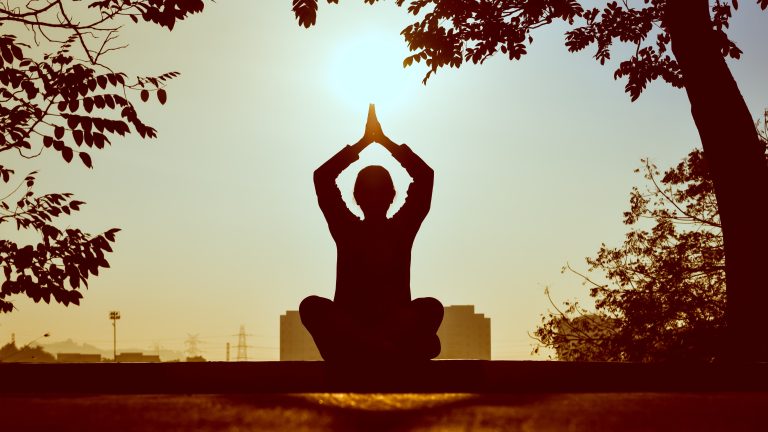Let’s start with the bitter truth: stress is unavoidable. Whether it’s work-related, personal, financial or social – we’re all dealing with it. But owing to how adversely it can affect our physical and mental health, managing and coping with stress is a must.
This brings us to our topic for today: stress reduction. In this article, we’ll observe how stress affects us, explore stress reduction techniques and discuss how meditation can help us manage stress better. Let’s dive in and learn how to cope with stress like a pro!
Impact of Stress on the Body
In moderate amounts, stress can be helpful. But when it prolongs and begins to affect our day-to-day activities, it can be detrimental to our body, thoughts and actions (even when we don’t realise it). Chronic (long-term stress) can be the cause of headaches, insomnia, digestive problems, anxiety, and depression. Moreover, it can also increase the risk of heart disease, diabetes, and other chronic health conditions.
What are the different Stress Reduction Techniques?
Now that we have established that stress is not something you can just ignore, let’s look at some simple and effective techniques that can help you de-stress and improve your overall well-being:
1. Meditation
First and foremost, let’s begin with our favourite: meditation! We all know meditation to be a technique that helps one focus the mind. But it’s also a very well-known stress buster. From mindfulness to the body scan, there are several meditation techniques that you can try to relieve stress, relax and achieve a mentally clear and emotionally calm state.
2. Exercise & Yoga
There’s no denying the connection between exercise and mental health. The sweet release of endorphins from moving your body leads to significant mood improvement and stress reduction – a wonderful feeling indeed! And a technique that is quickly becoming a global favorite exercise routine is yoga. Yoga is a mind-body practice that combines meditation and physical postures to achieve a state of relaxation. Several studies show that yoga helps reduce symptoms of anxiety and depression and promotes psychological well-being. Well, this is your sign to get started – even if it’s just 10 minutes every day!
3. Sound Bath
A sound bath is an interesting stress-reduction technique for sound and music enthusiasts. When indulging in this meditative process, you listen to sounds that are believed to promote relaxation and healing – such as singing bowls, gongs, and chimes. The vibrations of the instruments help release tension and promote physical and emotional healing. Sound baths are also highly beneficial as they can help you enter a meditative state quickly and easily.
4. Unwind Routine
You may also bid adieu to stress by following an unwind routine. Including a set of activities done before bed or at the end of the day, an unwind routine helps you relax and wind down. This might mean taking a warm bath, playing with your pet, reading a book, or even enjoying a cup of tea. The goal, however, is to be consistent. When you do the same activities every day at the same time, you indirectly train your body and mind to associate those activities with relaxation. Over time, your unwind routine will become your powerful tool to manage stress.
5. Deep Breathing
Taking slow, deep breaths is sometimes all you need to relax in high-stress situations. Deep breathing helps increase the amount of oxygen and reduce the stress hormones in your blood. Since it can be done anywhere, deep breathing is recommended as a quick technique to help stay calm when something disturbing happens.
Download the app today!
6. Listening to Calming Stories
You’re never too old to hear a story – especially one that soothes your mind and soul. Enter calming stories. With comforting music and gentle narration, these stories create a peaceful atmosphere, help reduce stress and promote relaxation. They also help improve sleep quality, which is essential for overall health and well-being.
7. Eat Healthily
Did you know that your diet can also impact your stress levels? Yes, an increased intake of sugar and consuming high-processed foods may harm your overall health and mood. When you eat healthy, nutrient-rich foods, you not only nourish your body but also improve your resilience to stress.
8. Reduce Screen Usage
We know, we know. This is easier said than done – especially at a time when screens surround us everywhere! But excessive usage of your smartphone and devices can lead to increased stress and mental health disorders. It can also affect your sleep schedule which in turn leads to increased stress levels.
9. Practice Self-Care
Setting aside time to practice self-love and self-care can also help reduce stress. Simple activities such as taking a walk in the park, reading your favourite book or indulging in a spa or massage can be beautiful ways to enhance your quality of life.
10. Spend Time with Friends and Family
One cannot deny the importance of having a reliable network of friends and family to lean on in good and bad times. Being socially connected can help alleviate stress, increase happiness and make you feel better.
So if you’re feeling overwhelmed and stressed, don’t hesitate to try some of these stress reduction techniques. A little practice is all you need to learn to manage your stress and improve your overall happiness.

Meet your Happiness Goals on Happily
Our Relevant Products
Feel Calm
Feel Motivated
Mindful Relationships
Personal Growth
Brtter Sleep
Slowing Down
and many more...
How does Meditation help Reduce Stress?
We have already established that meditation is a popular and effective stress-reduction technique. But how does it help reduce stress? Here’s how. During meditation, you focus your mind on a particular object or activity. In doing so, you stop focusing on the anxious, jumbled thoughts that worry and cloud your mind. Instead, you focus on something that calms you. This activity helps you stay centred and find calm and inner peace.
Let’s take a closer look at some of the benefits of meditation for stress reduction:
1. Reduces Cortisol Levels: Cortisol, the stress hormone in our body, can harm us in many ways – weight gain, high blood pressure, and anxiety. Meditation helps reduce cortisol levels, which can help to reduce the harmful effects of stress on your body. Moreover, studies have also found meditation to increase the body’s neurotransmitters (dopamine, serotonin, endorphins) that help to enhance well-being.
2. Improves Sleep Quality: Stress can cause sleep disturbances that further amplify the negative effects of stress on your health. Meditation improves sleep quality and battle insomnia. When you meditate, you enter a state of deep relaxation which stays with you long after your session ends. This state of calm and centredness that you take with you into all other activities and aspects of life allows you to drift off to sleep easily at night.
3. Enhances Emotional Regulation: Meditation enhances your emotional regulation skills, which can help you to cope with stressful situations more effectively. Instead of reacting to a circumstance with an emotional outburst, meditation allows you to observe your thoughts and feelings objectively from a distance. However, this doesn’t mean that you must repress your feelings to find inner peace! Instead, by meditating, you allow your thoughts and emotions to freely move in and out of your consciousness as you reach a state of peace and pure awareness.
4. Improves Brain Function: Stress can impede cognitive function and reduce brain function. Meditation, on the other hand, helps improve brain function, such as attention and memory. It allows you to focus better on the task at hand without getting distracted by every passing thought, leading to enhanced work performance.
5. Promotes Relaxation: We all know that one can feel highly relaxed after a meditative session. But did you know that regular meditation can also help you develop long-term resilience? Research has found that disciplined meditation practitioners have decreased reactivity towards stress, allowing them to recover from stressful situations more easily.
By incorporating meditation into your daily routine, you can train your mind to focus on the present moment instead of dwelling on past regrets or future worries. And remember, it doesn’t have to be complicated or time-consuming. You can start with just a few minutes daily and gradually increase the duration as you become more comfortable. Calming stories, unwind routines, and guided meditations are easy, engaging and excellent techniques for beginners!
The Bottom Line
We all face stress and anxiety. And our fast-paced and demanding lifestyles don’t make it easy either. But taking a step back and prioritising your mental and emotional well-being is non-negotiable. While there are many techniques available at your disposal to reduce stress, meditation has proven to be an effective one. Take a deep breath and embark on your meditation journey today. Your mind and body will thank you.






